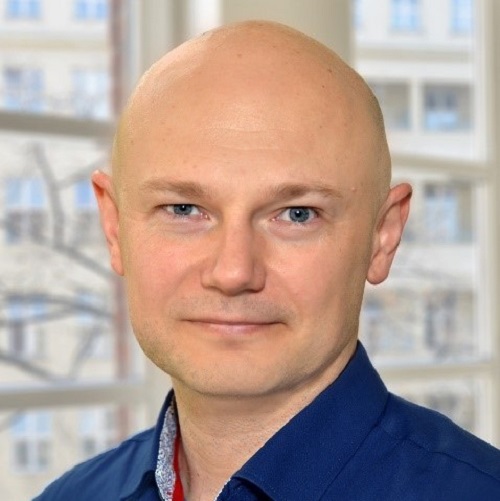Slovak scientist and virologist RNDr. Boris Klempa, DrSc., is internationally recognized professional in molecular epidemiology and ecology of zoonotic viruses fields. He works as a leading professional at Institute of Virology of Biomedical Research Centre of the Slovak Academy of Sciences (SAS). During the COVID-19 pandemic he actively participate in fight with the disease along with his team, from routine testing, RT-PCR tests development, validation of new sampling forms to genetic characterisation of new variants of virus. He was also actively engaged in public information improvement as well as vaccination campaign. We interviewed Boris Klempa about innovative solutions he is currently working on and evaluation of cooperation with commercial sphere.
You have participated in research and development of PCR COVID-19 tests with Multiplex DX, s.r.o. company. On the tests packages is displayed also logo of Biomedical Research Centre of the Slovak Academy of Sciences. What does it bring to SAS from financial and non-financial point of view? How did you establish this cooperation in SAS?
We have contract of cooperation signed with MDX which guarantees that MDX company share their incomes from products that were developed in our collaboration with us. In this cooperation has played significant role CEO Pavol Čekan, who personally and initiatively made an accent that the contract will bring benefits also for us from the very beginning and wanted to show positive precedent in the country how can cooperation between academic workplace and biotech company look like. Based on this contract we received payments 339 thousand euros last year. We have to really thank to exceptional generosity of Pavol Čekan that we have concluded so advantageous contract.
Could you tell us about innovative solutions you brought in last two years?
In MDX case we were not agents of innovations, more likely we validated partner´s innovations. We cooperated with other companies during the pandemic in similar way and verified or validated their products in contract research or simply due to scientific interest without any financial compensation.
“The most important for success is to be employed in reputable workplace and to be able to defend own position there.”
How do you assess the protection process? Is it easy for scientists to orient themselves in current legislative and intellectual property protection conditions?
This is most probably not easy for anyone or any country.
With how many companies you cooperated in Institute of Virology of Biomedical Research Centre of SAS during the pandemic?
They were five companies.
How many cooperations ended in output that can be considered as successful technology transfer example?
We have continual cooperation with MDX company that resulted in more than 10 certified products placed on the market so far.
You worked for 18 years in university clinic Charité in Berlin. How can you describe technology transfer process there? What differences you see in comparison with Slovakia?
Charité is a huge juggernaut, so I considered it complicated and hindering real cooperation there as well. Difficulty of process resulted for example also in situation that no cooperation was in fact established.
Based on your rich professional experience, do you have any recommendations for young scientific workers how to win recognition and become successful in their work?
The most important for success is to be employed in reputable workplace and to be able to defend own position there.
Are you currently working on some new technical solution or innovation? If yes, on which specifically?
We strive to benefit from cooperation with MDX company in development of diagnostic also for other pathogens, not only SARS-CoV-2, but we are still at the beginning.
Which technical solution in biomedicine you have participated in its development you consider as the most significant and why?
They are for sure RT-qPCR test for SARS-CoV-2 detection from MDX company that were successfully used not only in Slovakia, but also abroad.
You have mentioned in one older interview that you consider as your biggest personal success realization of project series that led to establishing The European Archive of Virus Strains with aim to react very quickly in case new epidemics occur and via that improve public health and research conditions in particular European countries and even in all countries around the world. Who concretely is behind the idea of globally shared public archive? Were the outputs of the project patent protected?
Initiators of the project were our colleagues from Marseille and 9 laboratories participated in first project. We are in third continuation of the project in meantime and 45 institutions worldwide act as partners in it. The archive was so far financed as FP7 and H2020 European Union projects. However, at the end of current project in 2023 will consortium deal with deciding question of its further sustainability without financing it through the projects. The project outputs are not patent protected.


